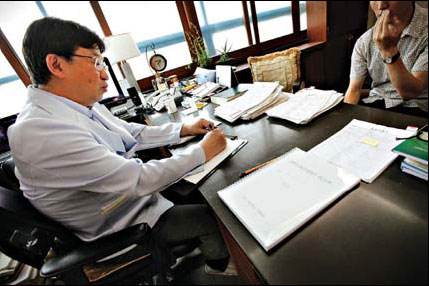Where shamans trump therapists, suicides soar
Updated: 2011-07-18 14:00
By Mark Mcdonald (China Daily/Agencies)
|
|||||||||||
 |
|
Jin-seng Park, a psychiatrist in Seoul, says new patients can be shocked at having to pay for talk therapy. Woohae Cho for the international herald tribune |
More than 30 South Koreans kill themselves every day. The recent suicides of four students and a professor at Korea's leading university shocked the nation. In recent weeks a baseball announcer, two professional soccer players, a university president and the former lead singer in a boy band killed themselves.
And yet Koreans - while almost obsessively embracing Western innovations - have largely resisted Western psychotherapy.
"Talking openly about emotional problems is still taboo," said Dr. Kim Hyongsoo, a psychologist and professor at Chosun University in Kwangju. "If someone goes to a psychoanalyst, they know they'll be stigmatized for the rest of their life. So they don't go."
Even when Koreans do seek out counseling, the learning curve can be steep. A prominent psychiatrist with a practice in Seoul, Jin-seng Park, said it was not uncommon for some new patients to come to his office, talk over a problem for 40 minutes and then be shocked when they're presented with a bill.
"They'll say, 'I have to pay? Just for talking? I can do that for free with my friend or my pastor,'" said Dr. Park. Most patients simply ask for, and expect, medication, he said.
"Koreans are getting more comfortable with Western psychotherapy, but this is limited to the highly educated and those familiar with Western ways," said Dr. Oh Kyung-ja, a Harvard-trained professor of psychology at Yonsei University in Seoul.
Meanwhile, the suicide rate in South Korea doubled in the decade between 1999 and 2009. Suicide pacts among strangers who meet online is a growing phenomenon.
"We have seen a rapid increase in depression, and I'd say 80 to 90 percent of our suicides are byproducts of depression," said Dr. Kim.
"That issue is still very closed. We still conceal it."
South Korean society has traditionally been underpinned by Buddhist and Confucian values, which emphasize diligence, stoicism and modesty. Some experts trace South Korea's emotional malaise to the decline of these traditional values and the rise of the country as a modern industrial power.
"As the society became more oriented toward materialism, people started to compare themselves," said Dr. Park. "We have a saying, 'If one cousin buys land, the other cousin gets a stomachache.'"
Golf and hiking, alcohol, organized religion, the Internet and travel are common stress relieving outlets now.
Shamanism, too, has made something of a comeback, with an estimated 300,000 shamans operating, many of them maintaining Web sites even as they continue to strangle chickens and commune with dead relatives.
"More Koreans see fortunetellers than psychiatrists," said Dr. Yoon Dae-hyun, a psychiatrist at Seoul National University Hospital.
Psychiatrists also get competition from room salons - after-work clubs frequented by businessmen who select from a bevy of personal hostesses who ply them with expensive drinks and listen to their problems.
"Koreans are trying to find their own 'package,' their own set of remedies," said Dr. Oh. "They are desperately searching for things to do to divert themselves from stress. They just don't have a good model."
The New York Times